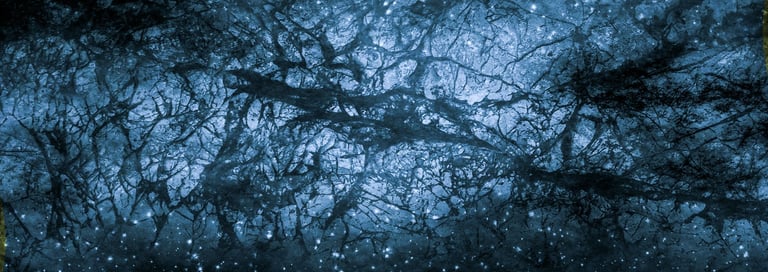Dark Matter and Hindu Scriptures: A Mysterious Connection
SPIRITUALITYSPACESCIENCE
Sahil Sharma
10/17/20232 min read
Dark matter is one of the most puzzling mysteries in modern science. It is a substance that makes up about 85% of the matter in the universe, but it is invisible and undetectable by any known means.
Dark matter can only be inferred from its gravitational effects on visible matter, such as stars and galaxies. Without dark matter, the galaxies would not be able to hold together and would fly apart.
Historic References of Dark Matter in Hindu Scriptures
The ancient Hindu scriptures, such as the Vedas and the Upanishads, contain many passages that can be interpreted as describing dark matter. For example, the following verse from the Rig Veda (10.129.1) states:
"There is a darkness in the heavens above, a darkness in the heavens below, darkness in the middle space between. Darkness is all, and darkness at the end."
This verse can be interpreted as describing a universe that is filled with a dark substance, which is invisible to the naked eye.
Another verse from the Bhagavad Gita (11.12) states:
"I am the darkness that is hidden in the womb of all things."
This verse can be interpreted as describing the all-pervading nature of dark matter, which is present in every part of the universe.
Conclusion
The relationship between dark matter and Hindu scriptures is a fascinating and complex one. While there is no scientific evidence to prove that the ancient Hindu sages had any knowledge of dark matter, the passages quoted above suggest that they may have had a deep understanding of the nature of the universe.
Modern Interpretations
Some modern physicists believe that the Hindu scriptures may offer insights into the nature of dark matter. For example, the physicist Fritjof Capra has argued that the concept of Brahman in Hinduism is similar to the concept of dark matter.
Brahman is the ultimate reality in Hinduism, and it is all-pervading and interconnected. Capra argues that the dark matter may be a manifestation of Brahman.
The relationship between dark matter and Hindu scriptures is an area of ongoing research. As we learn more about dark matter, it is possible that we will gain new insights into the ancient Hindu texts.
Additional Thoughts
It is interesting to note that the ancient Hindu sages were aware of the limitations of human perception. They knew that there was more to the universe than what we can see with our eyes. This is reflected in the following verse from the Upanishads (Chandogya Upanishad 4.10.2):
"The eye cannot see itself, nor can the mind grasp itself. That is why the self is said to be hidden."
This verse suggests that there is a deeper reality to the universe that is beyond the reach of our senses. Perhaps dark matter is a part of this deeper reality.


